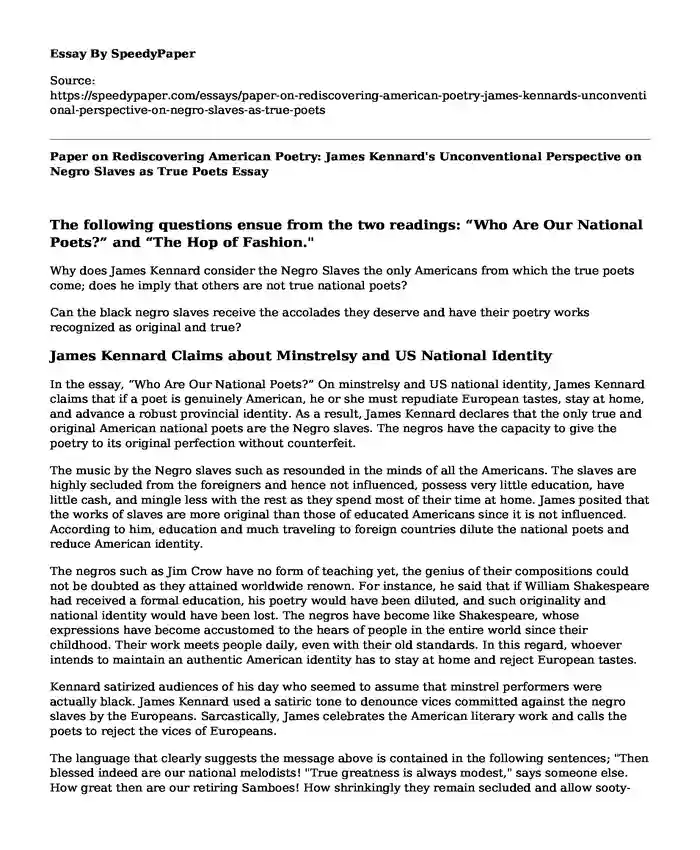
| Type of paper: | Essay |
| Categories: | Education Poem Literature |
| Pages: | 2 |
| Wordcount: | 537 words |
The following questions ensue from the two readings: “Who Are Our National Poets?” and “The Hop of Fashion."
Why does James Kennard consider the Negro Slaves the only Americans from which the true poets come; does he imply that others are not true national poets?
Can the black negro slaves receive the accolades they deserve and have their poetry works recognized as original and true?
James Kennard Claims about Minstrelsy and US National Identity
In the essay, “Who Are Our National Poets?” On minstrelsy and US national identity, James Kennard claims that if a poet is genuinely American, he or she must repudiate European tastes, stay at home, and advance a robust provincial identity. As a result, James Kennard declares that the only true and original American national poets are the Negro slaves. The negros have the capacity to give the poetry to its original perfection without counterfeit.
The music by the Negro slaves such as resounded in the minds of all the Americans. The slaves are highly secluded from the foreigners and hence not influenced, possess very little education, have little cash, and mingle less with the rest as they spend most of their time at home. James posited that the works of slaves are more original than those of educated Americans since it is not influenced. According to him, education and much traveling to foreign countries dilute the national poets and reduce American identity.
The negros such as Jim Crow have no form of teaching yet, the genius of their compositions could not be doubted as they attained worldwide renown. For instance, he said that if William Shakespeare had received a formal education, his poetry would have been diluted, and such originality and national identity would have been lost. The negros have become like Shakespeare, whose expressions have become accustomed to the hears of people in the entire world since their childhood. Their work meets people daily, even with their old standards. In this regard, whoever intends to maintain an authentic American identity has to stay at home and reject European tastes.
Kennard satirized audiences of his day who seemed to assume that minstrel performers were actually black. James Kennard used a satiric tone to denounce vices committed against the negro slaves by the Europeans. Sarcastically, James celebrates the American literary work and calls the poets to reject the vices of Europeans.
The language that clearly suggests the message above is contained in the following sentences; "Then blessed indeed are our national melodists! "True greatness is always modest," says someone else. How great then are our retiring Samboes! How shrinkingly they remain secluded and allow sooty-faced white men to gather all the honors and emoluments! The works of great men are always imitated. Even those miserable counterfeits….”.
James asserted that the negros possess the true poetry identity and, as such, by saying that "the works of great men are always imitated”, he means that the negro slaves' work is copied during the minstrel show. As a result, the show performers only imitate and do not feature the real actors, composers, and compliers. Hence, the minstrel show did not have actual black performers but white disguised as negros.
Cite this page
Paper on Rediscovering American Poetry: James Kennard's Unconventional Perspective on Negro Slaves as True Poets. (2023, Dec 06). Retrieved from https://speedypaper.com/essays/paper-on-rediscovering-american-poetry-james-kennards-unconventional-perspective-on-negro-slaves-as-true-poets
Request Removal
If you are the original author of this essay and no longer wish to have it published on the SpeedyPaper website, please click below to request its removal:
- Human Interleukin Genes - Research Paper References Sample
- MBA Admission Essay Sample
- Music and the Brain - Free Essay on the Role of Music in Teaching
- Free Example of a Counselor Reference Letter
- Free Essay Summary of the Book The Prince
- Paper Example on Why Online Classes are Better Than Traditional Classroom
- Essay Sample on How to Know That Your Message Reached the Intended Audience
Popular categories




